Sir John Monash, Personal Files Book 1, 6 January - 31 January 1915, Part 11
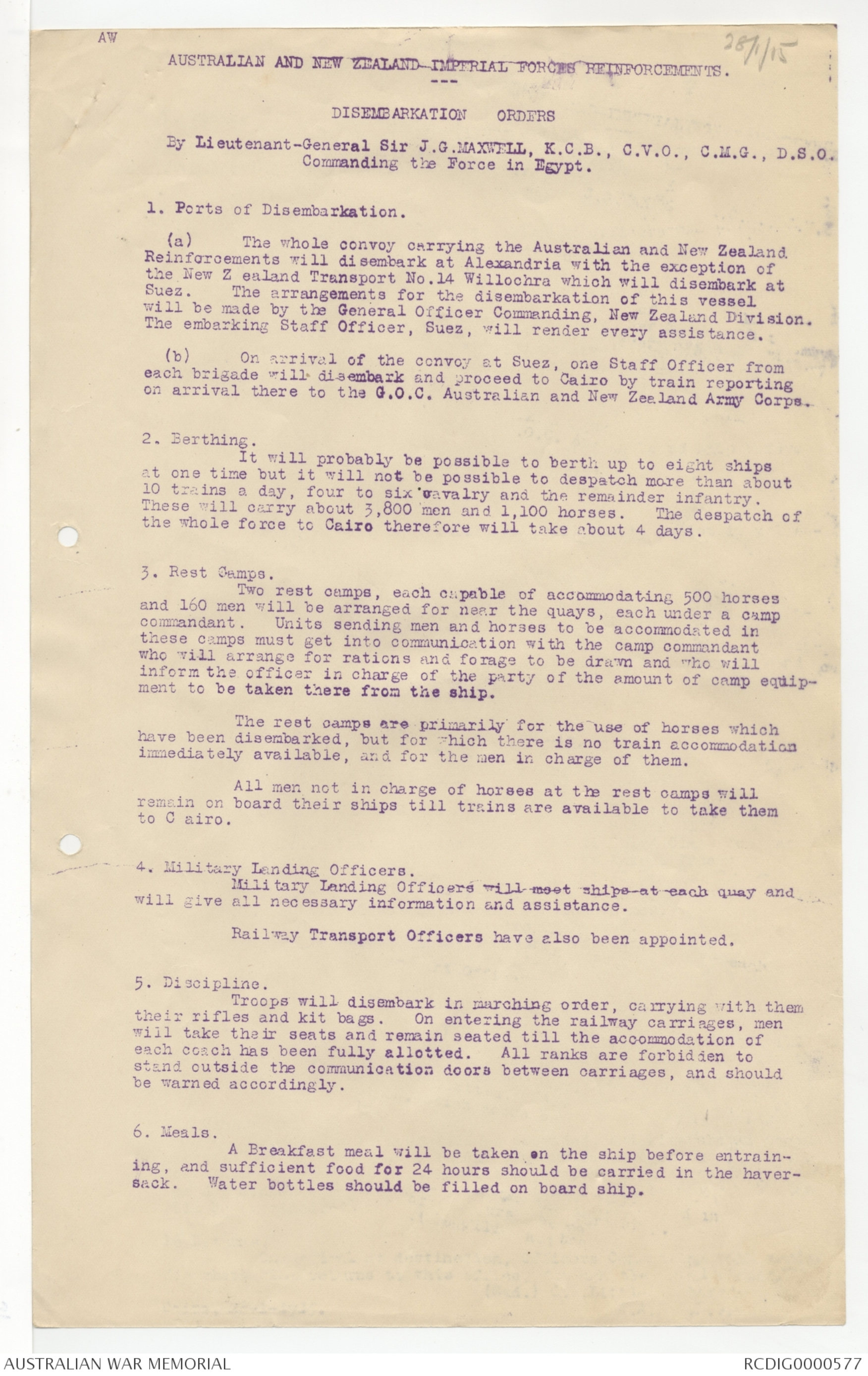
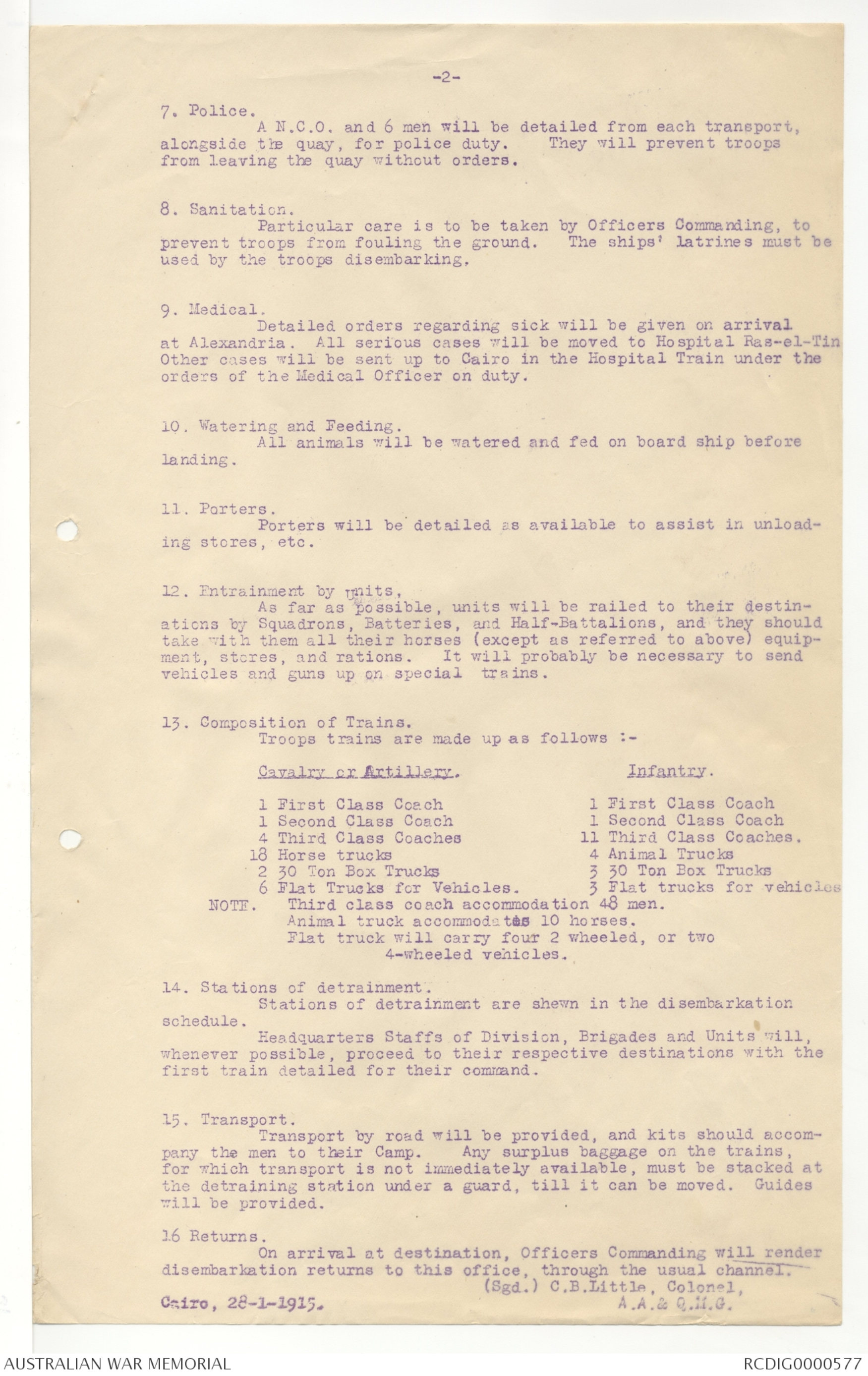
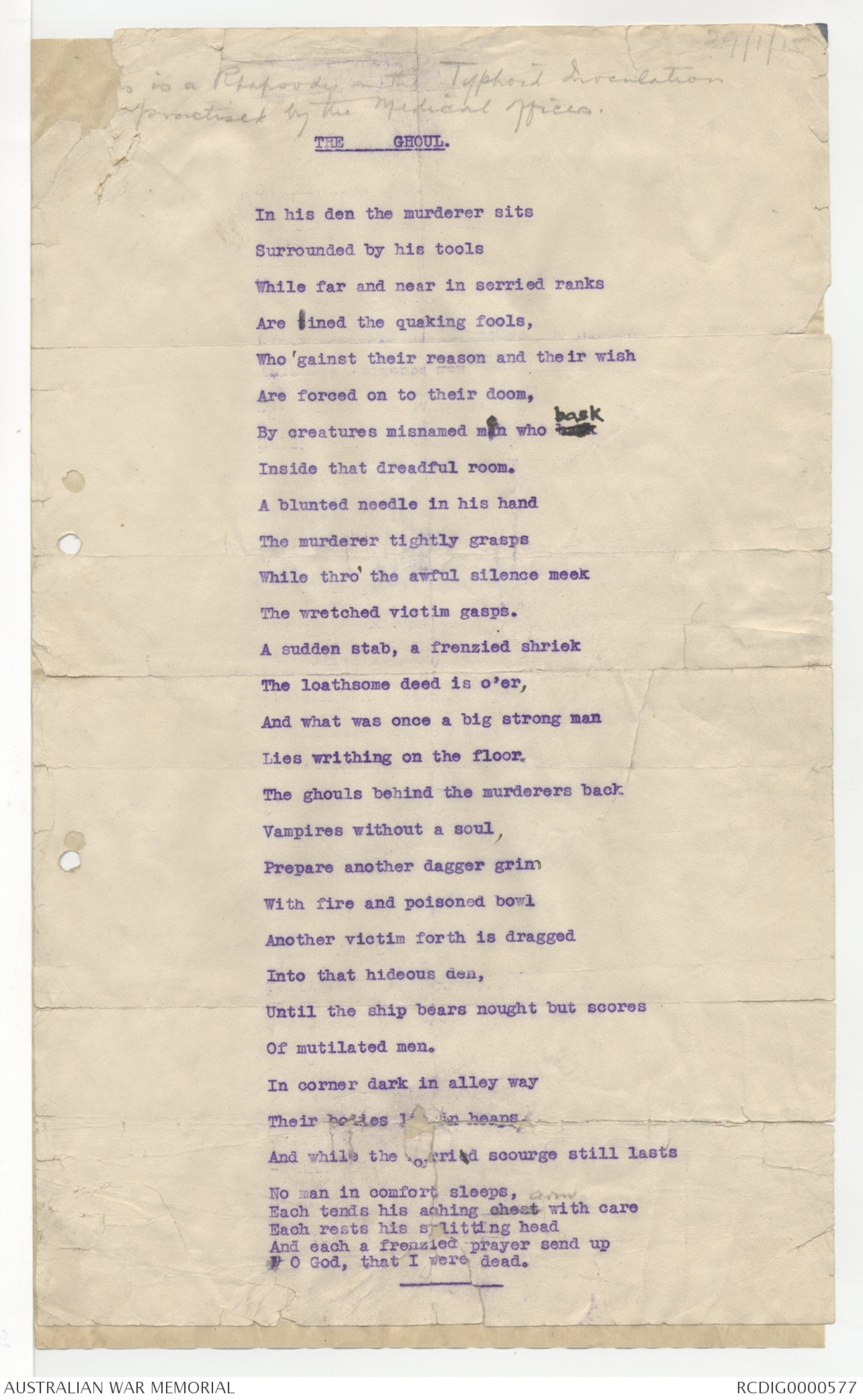
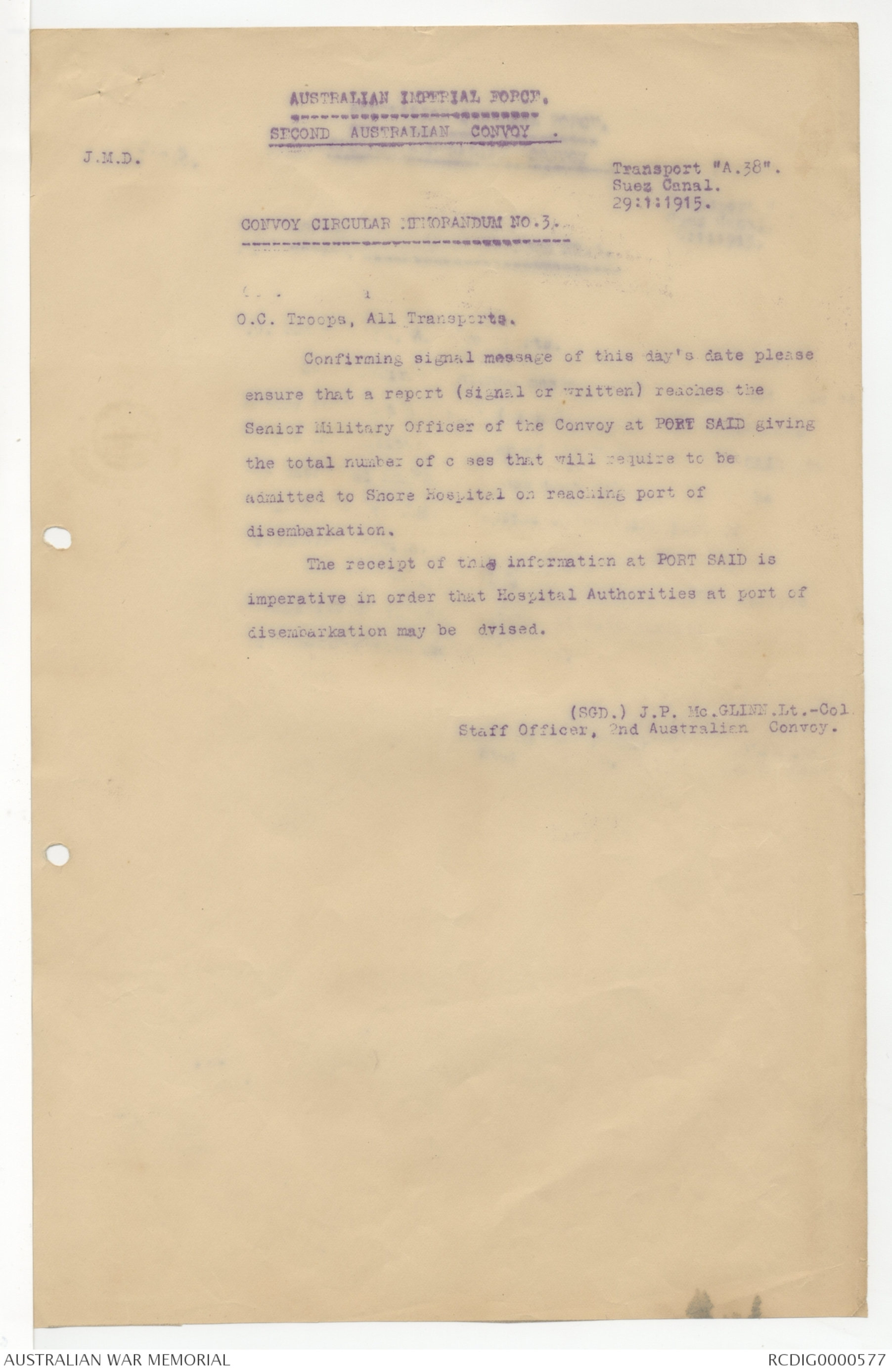
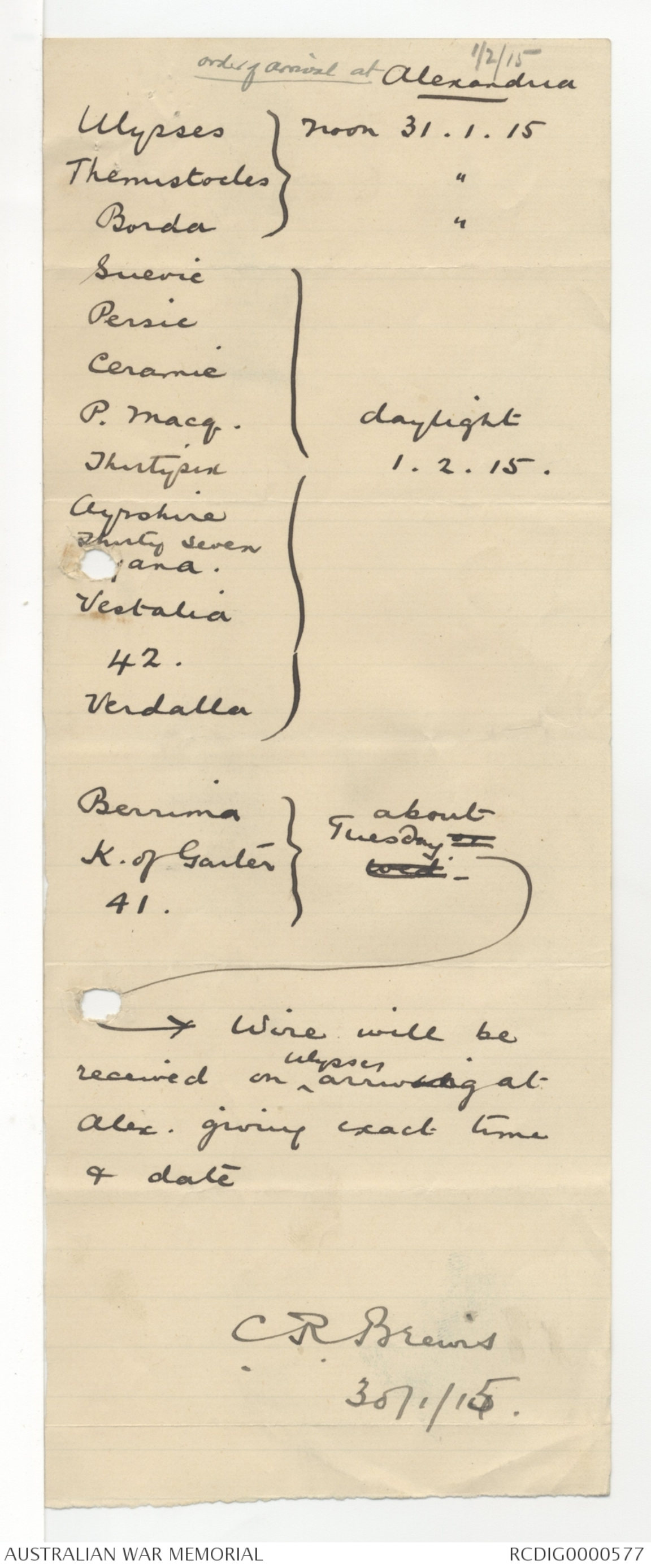
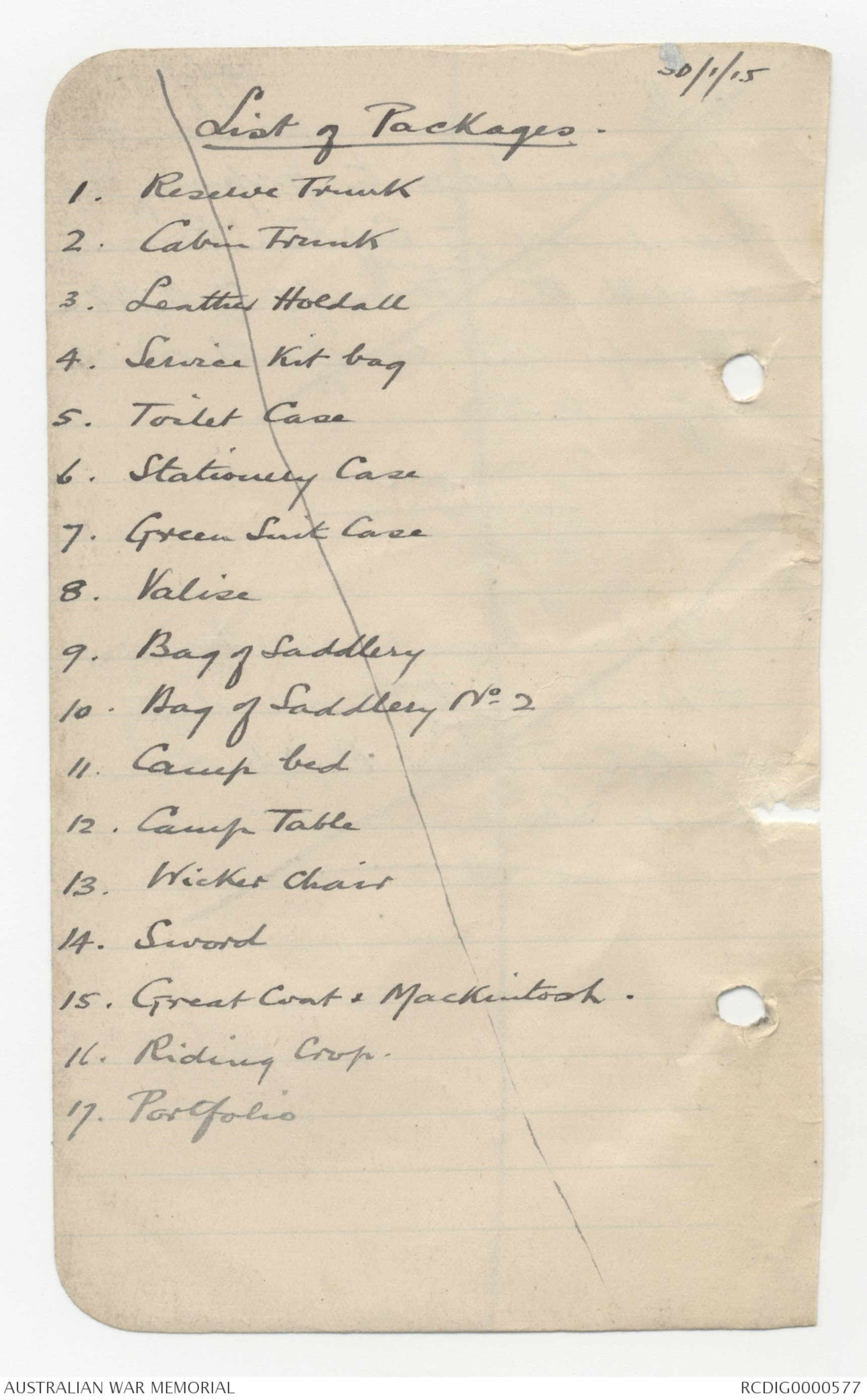
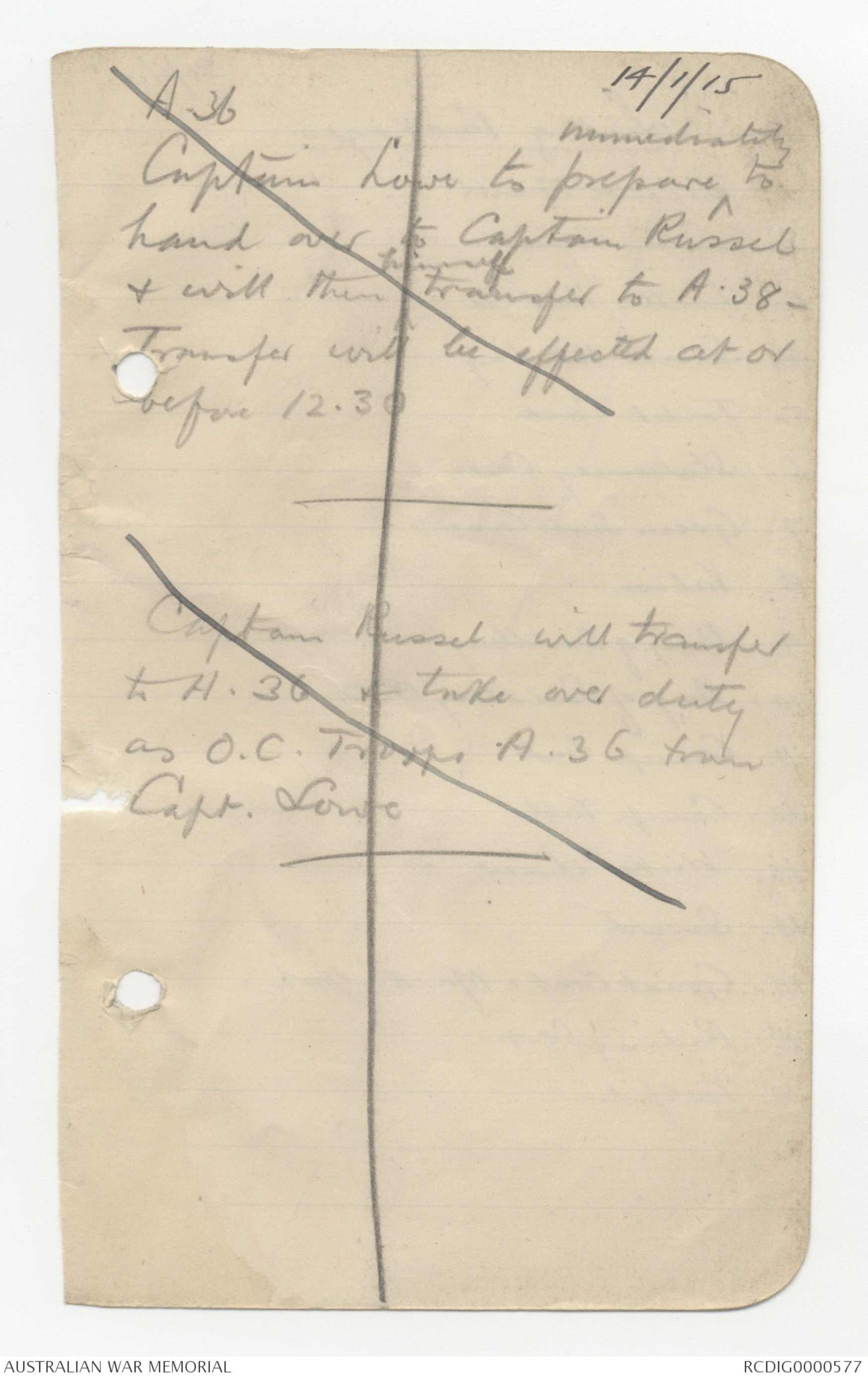
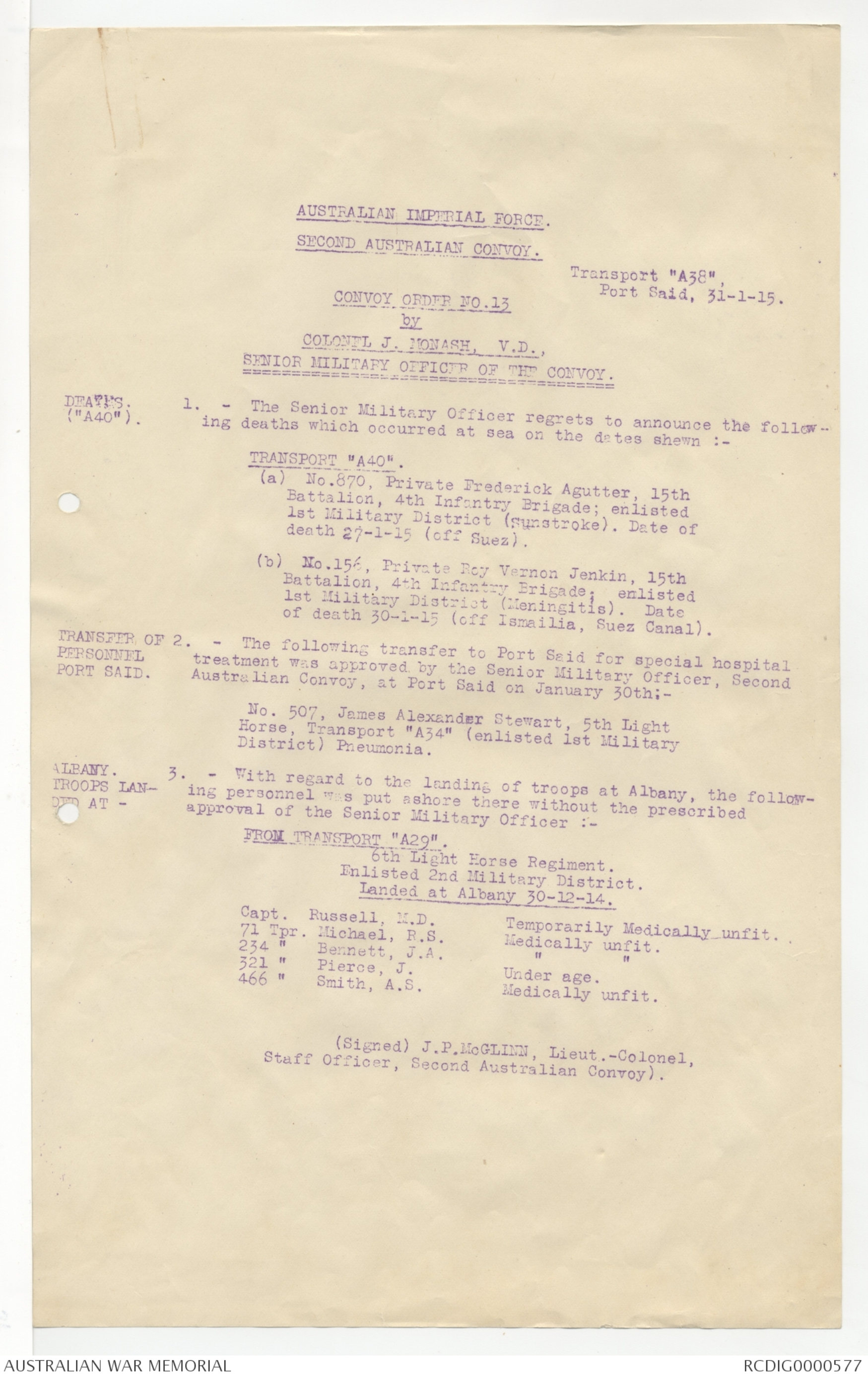
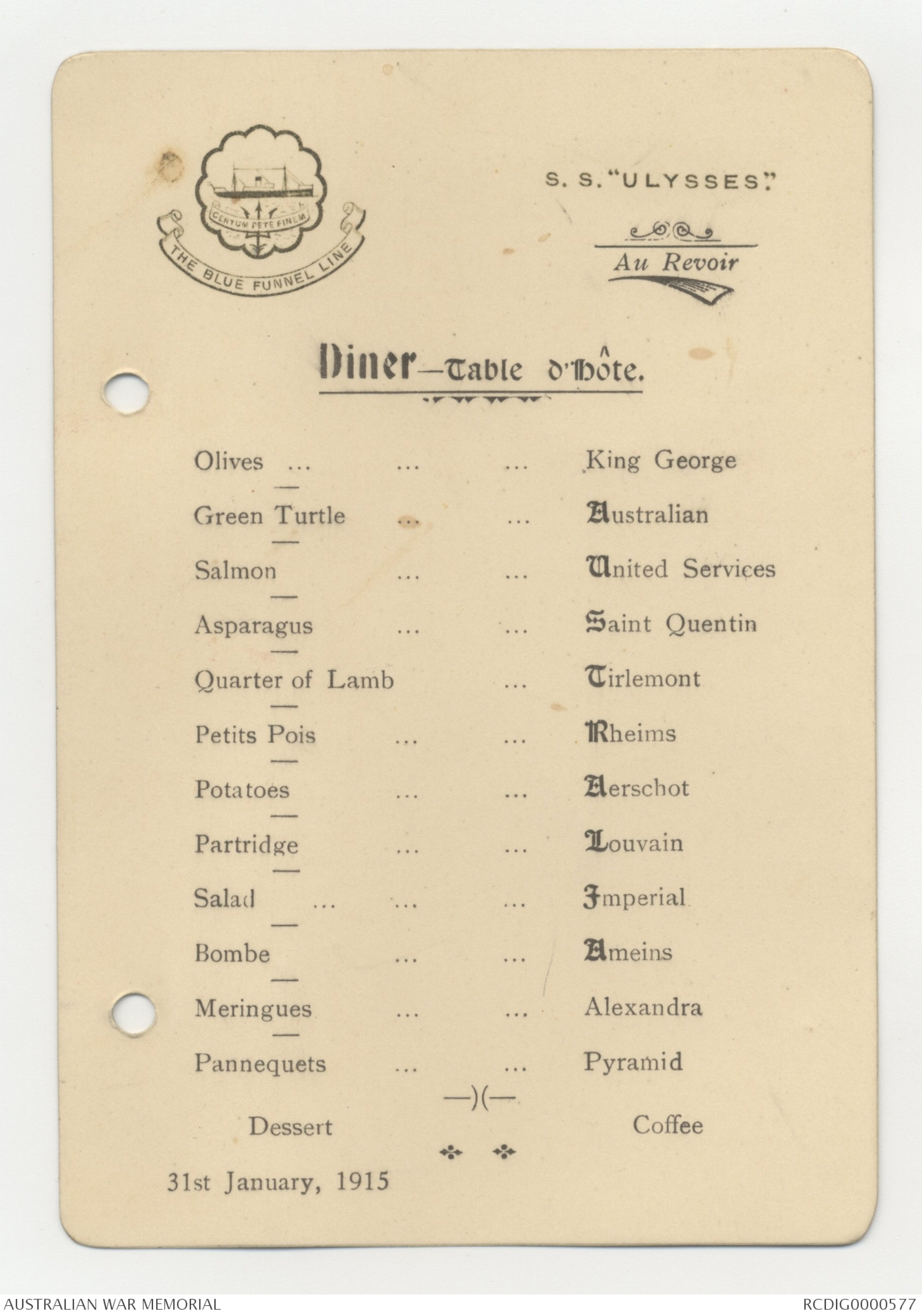
AW
28/1/15
AUSTRALIAN AND NEW ZEALAND IMPERIAL FORCES REINFORCEMENTS.DISEMBARKATION ORDERS
By Lieutenant-General Sir J.G. MAXWELL, K.C.B., C.V.O., C.M.G., D.S.O. Commanding the Force in Egypt.
1. Ports of Disembarkation.
(a) The whole convoy carrying the Australian and New Zealand
Reinforcements will disembark at Alexandria with the exception of
the New Zealand Transport No.14 Willoohra which will disembark at
Suez. The arrangements for the disembarkation of this vessel
will be made by the General Officer Commanding, New Zealand Division.
The embarking Staff Officer, Suez, will render every assistance.
(b) On arrival of the convoy at Suez, one Staff Officer from
each brigade will disembark and prceed to Cairo by train reporting
on arrival there to G.O.C. Australian and New Zealand Army Corps.
2. Berthing.
It will probably be possible to berth up to eight ships
at one time but it will not be possible to despatch more than about
10 trains a day, four to six cavalry and the remainder infantry.
These will carry about 3,800 men and 1,100 horses. The despatch of
the whole force to Cairo therefore will take about 4 days.
3. Rest Camps.
Two rest camps, each capable of accommodating 500 horses
and 160 men will be arranged for near the quays, each under a camp
commandant. Units sending men and horses to be accommodated in
these camps must get into communication with the camp commandant
who will arrange for rations and forage to be drawn and who will
inform the officer in charge of the party of the amount of camp equipment
to be taken there from the ship.
The rest camps are primarily for the use of horses which
have been disembarked, but for which there is no train accommodation
immediately available, and for the men in charge of them.
All men not in charge of horses at the rest camps will
remain on board their ships till trains are available to take them
to Cairo.
4. Military Landing Officers.
Military Landing Officers will meet ships at each quay and
will give all necessary information and assistance.
Railway Transport Officers have also been appointed.
5. Discipline.
Troops will disembark in marching order, carrying with them
their rifles and kit bags. On entering the railway carriages, men
will take their seats and remain seated till the accommodation of
each coach has been fully allotted. All ranks are forbidden to
stand outside communication doors between carriages, and should
be warned accordingly.
6. Meals.
A breakfast meal will be taken on the ship before entraining,
and sufficient food for 24 hours should be carried in the haversack.
Water bottles should be filled on board ship.
2-
7. Police.
A.N.C.O. and 6 men will be detailed from each transport,
alongside the quay, for police duty. They will prevent troops
from leaving the quay without orders.
8. Sanitation.
Particular care is to be taken by Officer Commanding, to
prevent troops from fouling the ground. The ships' latrines must be
used by the troops disembarking.
9. Medical.
Detailed orders regarding sick will be given on arrival
at Alexandria. All serious cases will be moved to Hospital Ras-el-Tin
Other cases will be sent up to Cairo in the Hospital Train under the
orders of the Medical Officer on duty.
10. Watering and Feeding.
All animals will be watered and fed on board ship before
landing.
11. Porters.
Porters will be detailed as available to assist in unloading
stores, etc.
12. Entrainment by units.
As far as possible, units will be railed to their destinations
by Squadrons, Batteries, and Half-Battalions, and they should
take with them all their horses (except as referred to above) equipment,
stores, and rations. It will probably be necessary to send
vehicles and guns up on special trains.
13. Composition of Trains.
Troop trains are made up as follows :-
Cavalry or Artillery. Infantry.
1 First Class Coach 1 First Class Coach
1 Second Class Coach 1 Second Class Coach
4 Third Class Coaches 11 Third Class Coaches.
18 Horse trucks 4 Animal Trucks
2 30 Ton Box Trucks 3 30 Ton Box Trucks
6 Flat Trucks for Vehicles. 3 Flat trucks for vehicles
NOTE. Third class coach accommodation 48 men.
Animal truck accommodates 10 horses.
Flat truck will carry four 2 wheeled, or two
4-wheeled vehicles.
14. Stations of detrainment.
Stations of detrainment are shown in the disembarkation
schedule.
Headquarters Staffs of Division, Brigades and Units will,
whenever possible, proceed to their respective destinations with the
first train detailed for their command.
15. Transport.
Transport by road will be provided, and kits should accompany
the men to their Camp. Any surplus baggage on the trains,
for which transport is not immediately available, must be stacked at
the detraining station under a guard, till it can be moved. Guides
will be provided.
16. Returns.
On arrival at destination, Officers Commanding will render
disembarkation returns to this office, through the usual channel.
(Sgd.) C.B.Little, Colonel,
Cairo, 28-1-1915. A.A. & Q.M.G.
[[?]] is a Rhapsody in the Typhoid Investation
practised by the Medical Officers.
THE GHOUL.
In his den the murderer sits
Surrounded by his tools
While far and near in serried ranks
Are lined the quaking fools,
Who 'gainst their reason and their wish
Are forced on to their doom,
By creatures misnamed men who bark bask
Inside that dreadful room.
A blunted needle in his hand
The murderer tightly grasps
While thro' the awful silence meek
The wretched victim gasps.
A sudden stab, a frenzied shriek
The loathsom deed is o'er,
And what was once a big strong man
Lies writhing on the floor.
The ghouls behind the murderers back
Vampires without a soul,
Prepare another dagger grim
With fire and poisoned bowl
Another victim forth is dragged
Into that hideous den,
Until the ship nears nought but scores
Of mutilated men.
In corner dark in alley way
Their bodies lie in heaps
And while the horried scourge still lasts
No man in comfort sleeps,
Each tends his aching chest arm with care
Each rests his splitting head
And each a frenzied prayer send up
O God, that I were dead.
AUSTRALIAN IMPERIAL FORCE.
SECOND AUSTRALIAN CONVOY.
J.M.D.
Transport "A.38".
Suez Canal.
29:1:1915.
CONVOY CIRCULAR MEMORANDUM NO. 3.
O.C. Troops, All Transports.
Confirming signal message of the day's date please
ensure that a report (signal or written) reaches the
Senior Military Officer of the Convoy at PORT SAID giving
the total number of cases that will require to be
admitted to Shore Hospital on reaching port of
disembarkation.
The receipt of this information at PORT SAID is
imperative in order that Hospital Authorities at port of
disembarkation may be dvised.
(SGD.) J.P. Mc. GLINN. Lt.-Col
Staff Officer, 2nd Australian Convoy
1/2/15
order of arrival at Alexandria
Ulysses Noon 31.1.15
Themistocles "
Borda "
Suevic
Persic
Ceramic
P. Macq. daylight
Ayrshire 1. 2. 15.
Thirty Seven
[[?ana]]
Vestalia
42.
Verdalla
Berrima about
K. of Garter Tuesday or
41. Wed→
→ Wire will be
received on Ulysses arriving at
Alex. giving exact time
& date
C.R. Brewis
30/1/15.
30/1/15
List of Packages.
- Reserve trunk
- Cabin Trunk
- Leather Holdall
- Service Kit bag
- Toilet Case
- Stationery Case
- Green Suit Case
- Valise
- Bag of Saddlery
- Bag of Saddlery No 2
- Camp bed
- Camp Table
- Wicker Chair
- Sword
- Great Coat & MacKintosh
- Riding Crop.
-
Portfolio
14/1/15
A 36
Captain Lowe to prepare immediately to
hand over to Captain Russel
& will then himself transfer to A.38.
transfer will be effected at or
before 12.30
Captain Russel will transfer
to A.36 & take over duty
as O.C. Troops A.36 from
Capt. Lowe
AUSTRALIAN IMPERIAL FORCE.
SECOND AUSTRALIAN CONVOY.
Transport "A38",
Port Said, 31-1-15.
CONVOY ORDER NO. 13
by
COLONEL J. MONASH V.D.,
SENIOR OFFICER OF THE CONVOY.
[*DEATHS. 1. - The Senior Military Officer regrets to announce the following
("A40").] deaths which occurred at sea on the dates shown :-
TRANSPORT "A40".
(a) No. 870, Private Frederick Agutter, 15th
Battalion, 4th Infantry Brigade; enlisted
1st Military District (sunstroke). Date of
death 27-1-15 (off Suez).
(b) No.156, Private Roy Vernon Jenkin, 15th
battalion, 4th Infantry Brigade; enlisted
1st Military District (Meningitis). Date
of detah 30-1-15 (off Ismailia, Suez Canal).
[*TRANSFER OF 2. - The following transfer to Port Said for special hospital
PERSONANEL treatment was approved by Senior Military Pfficer, Second
PORT SAID.] Australian Convoy, at Port Said on January 30th;-
No. 507, James Alexander Stewart, 5th Light
Horse, Transport "A34" (enlisted 1st Military
District) Pneumonia.
[*ALBANY. 3. - With regard to the landing of troops at Albany, the
TROOPS following personnel was put ashore there without the
LANDED AT-] approval of the Senior Military Officer :-
FROM TRANSPORT "A29"
6th Light Horse Regiment.
Enlisted 2nd Military District.
Landed at Albany 30-12-14
Capt. Russel, M.D. Temporarily Medically unfit.
71 Tpr. Michael, R.S. Medically unfit.
234 " Bennett, J.A. " "
321 " Pierce, J. Under age.
466 " Smith, A.S. Medically unfit.
(Signed) J.P. McGLINN, Lieut.-Colonel,
Staff Officer, Second Australian Convoy).
The Blue Funnel Line
S.S. "ULYSSES."
Au Revoir
Diner- Table D'Hote.
Olives King george
Green Turtle Australia
Salmon United Services
Asparagus Saint Quentin
Quarter of Lamb Tirlemont
Petits Pois Rheims
Potatoes Aerschot
Partridge Louvain
Salad Imperial
Bombe Ameins
Meringues Alexandra
Pannequets Pyramid
Dessert Coffee
31st January, 1915
 Jacqueline Kennedy
Jacqueline KennedyThis transcription item is now locked to you for editing. To release the lock either Save your changes or Cancel.
This lock will be automatically released after 60 minutes of inactivity.